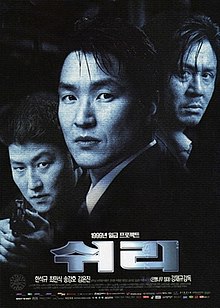
Back شيري (فيلم) Arabic شيرى (فيلم 1999) ARZ শিরি (চলচ্চিত্র) Bengali/Bangla Shiri German شیری (فیلم) Persian Shiri Finnish Nom de code : Shiri French Shiri (film) ID Swiri Italian シュリ Japanese
| Shiri | |
|---|---|
 Theatrical release poster | |
| Hangul | 쉬리 |
| Revised Romanization | Swiri |
| McCune–Reischauer | Shwiri |
| Directed by | Kang Je-gyu |
| Written by | Kang Je-gyu |
| Produced by | Byeon Moo-rim Lee Kwan-hak |
| Starring | Han Suk-kyu Choi Min-sik Song Kang-ho Yunjin Kim |
| Cinematography | Kim Seong-bok |
| Edited by | Park Gok-ji |
| Music by | Lee Dong-joon |
Production companies |
|
| Distributed by | Samsung Entertainment |
Release date |
|
Running time | 125 minutes |
| Country | South Korea |
| Language | Korean |
| Budget | US$8.5 million (est.) |
Shiri (Korean: 쉬리; RR: Swiri) is a 1999 South Korean action spy film, written and directed by Kang Je-gyu. It was the first Hollywood-style big-budget blockbuster to be produced in the new Korean film industry (i.e. after Korea's major economic boom in the late 1990s).[1] Created as a deliberate homage to the "high-octane" action film made popular by Hollywood through the 1980s, it also contained a story that draws on strong Korean national sentiment to fuel its drama.[1] Much of the film's visual style is shared with that of Asian action cinema, particularly Hong Kong action cinema such as John Woo, Tsui Hark, Ringo Lam, and the relentless pace of the second unit directors, like Vic Armstrong and Guy Hamilton, in the James Bond films.[2]
The film was released under the name Shiri outside of South Korea; in South Korea the title was spelled Swiri. The name refers to Coreoleuciscus splendidus, a fish found in Korean fresh-water streams. At one point in the film protagonist Park Mu-young has a monologue wherein he describes how the waters from both North and South Korea flow freely together, and how the fish can be found in either water without knowing to which it belongs. This ties into the film's ambitions to be the first major-release film to directly address the still-thorny issue of Korean reunification.[3]
- ^ a b Anthony Leong (2001). "Shiri Movie Review" Archived 2020-02-19 at the Wayback Machine. Media Circus. Retrieved 11 November 2007.
- ^ Scott Hamilton; Chris Holland (16 April 2002). "Shiri" Archived 2007-12-02 at the Wayback Machine. Stomp Tokyo. Retrieved 11 November 2007.
- ^ Joshua Tanzer (8 February 2002). "The schlock is ticking" Archived 2008-10-07 at the Wayback Machine. Off Off Off. Retrieved 11 November 2007.